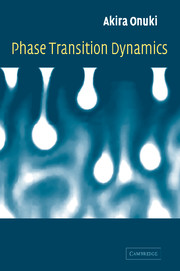5 - Dynamic models
Published online by Cambridge University Press: 13 August 2009
Summary
Slow collective motions in physical systems, particularly those near the critical point, can be best described in the framework of Langevin equations. We may set up Langevin equations when the timescales of slow and fast dynamical variables are distinctly separated. This framework originates from the classical Brownian motion and is justified microscopically via the projection operator formalism. First, in Sections 5.1–5.2, these general aspects will be discussed with a summary of the projection operator method in Appendix 5B. Second, in Section 5.3, we will examine simple Langevin equations in critical dynamics (models A, B, and C) and introduce dynamic renormalization group theory. These models have been used extensively to study fundamental problems in critical dynamics and phase ordering. Third, in Section 5.4, we will review the general linear response theory, putting emphasis on linear response to thermal disturbances.
Langevin equation for a single particle
Brownian motion
Most readers will be aware of the zig-zag motions of a relatively large particle, calleda Brownian particle, suspended in a fluid. When its mass m0 is much larger than those of the surrounding particles, appreciable changes of the velocity of the Brownian particle can be caused as a result of a large number of collisions with the surrounding molecules.
Information
- Type
- Chapter
- Information
- Phase Transition Dynamics , pp. 191 - 226Publisher: Cambridge University PressPrint publication year: 2002
